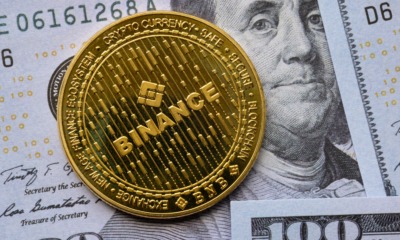Bitcoin
Here Is Why Bitcoin (BTC) Does Not Need the SEC, Wall Street and an ETF to be Great

When the Bitcoin (BTC) ledger was launched back in 2009, Satoshi Nakamoto intended for the network to facilitate a peer-to-peer electronic cash system that was independent of third party financial institutions. Satoshi had more or less implied that these latter institutions had gained control over the global payment systems as well as our way of thinking as to how we should conduct day to do business.
In Bitcoin’s whitepaper, Satoshi had this to say in the abstract section of the document:
“A purely peer-to-peer version of electronic cash would allow online payments to be sent directly from one party to another without going through a financial institution. Digital signatures provide part of the solution, but the main benefits are lost if a trusted third party is still required to prevent double-spending.”
He would also add the following in the introductory section of the same document.
“Commerce on the Internet has come to rely almost exclusively on financial institutions serving as trusted third parties to process electronic payments. While the system works well enough for most transactions, it still suffers from the inherent weaknesses of the trust based model.”
What he meant by this, is that the Bitcoin network could completely eliminate the need for financial institutions in everyday commerce. This would, in turn, reduce transaction costs, solve disputes quicker – since transactions are immutable on the ledger – as well as allowing two parties to transact without the need for a third party to validate the transaction. We would also have our ‘money’ neatly stashed away in our encrypted wallets away from banks that can use the money to make profits without our knowledge (which they do).
Therefore, do we really need Wallstreet and an ETF to validate the value of Bitcoin?
In a sense, we do not need Wallstreet. One is tempted to say that our thinking has been ‘polluted’ by the old model of doing things. We have been led to believe that we need the reputable financial institutions and governments to tell us that a payment product, such as Bitcoin, is great.
You can also argue that the same financial institutions have the right to use Bitcoin and its open source code to further their cause in the same industries that they thrive in. Bitcoin is completely permission-less. Therefore, it is within their rights to seek regulation of products such as ETFs.
Summing it all up
We, the users, need to remember what attracted us to Bitcoin in the first place. We were tired of high transaction costs while using regular payments avenues; institutions having our personal information, and we wanted to regain back our right as The People with a decentralized currency and network.
We have been led to believe that we need Wallstreet and an ETF to validate the precious Bitcoin and the other 1,700 or so cryptocurrencies in the markets. The fact remains that we do wield some power to determine the future of our digital assets.
Remember the SEC received over 1,300 public comments on their website for the CBOE Bitcoin ETF. This is one reason they chose to postpone their verdict. We, the people, let them know who is boss.
We can also opt not to care about the SEC and Wallstreet. We can opt to continue with business as usual in the crypto markets as well as using our digital assets as a means of payment for our day to day activities. We can manage to make BTC a global currency.
For the latest cryptocurrency news, join our Telegram!
Disclaimer: This article should not be taken as, and is not intended to provide, investment advice. Global Coin Report and/or its affiliates, employees, writers, and subcontractors are cryptocurrency investors and from time to time may or may not have holdings in some of the coins or tokens they cover. Please conduct your own thorough research before investing in any cryptocurrency and read our full disclaimer.
Image courtesy of Pexels
Bitcoin
Bitcoin Price Dumps Below $41,000 Amid Uncertainty

Bitcoin price dumped hard on Monday, briefly slipping below $41,000, erasing gains recorded in the previous week. The premier cryptocurrency seems to have exhausted its recent rally propelled by industry vulnerabilities. At the time of writing, the world’s largest cryptocurrency was trading slightly lower at $41,385. Bitcoin’s total market cap has dipped by 2% over the past day, while the total volume of BTC tokens traded over the same period climbed by 58%.
Fundamentals
Bitcoin price has been facing retracements and a rollercoaster over the past few days after recently rocketing to a 20-month peak. On-chain data has suggested that many investors used the opportunity to take some profits, leading to a decline in the asset’s price.
Bitcoin’s price slump is mirrored in the wider crypto market, with the global crypto market cap decreasing by 1.85% over the past 24 hours to $1.55 trillion. The total crypto market volume has increased by 32% over the same period. The Crypto Fear and Greed Index has plunged from a level of extreme greed to a greed level of 70, suggesting a decline in risk appetite.
Ethereum, the largest altcoin by market capitalization, is currently trading at $2,167, down almost 3% for the day. Meme coins have been hit hard by the market slump, with Dogecoin and Shiba Inu down by more than 4% over the last day.
Last week on Thursday, cryptocurrency experts took notice of…
Bitcoin
Bitcoin Price is in Consolidation Mode Despite Market Optimism Post-Fed Decision

Bitcoin price edged lower on Thursday despite optimism in wider markets on the back of the Fed’s interest rate decision. The flagship cryptocurrency has been consolidating above the critical level of $42,000 after briefly topping $44,000, its highest level in 20 months. Bitcoin was trading 0.71% lower at $42,569 at press time. BTC’s total market cap has increased by more than 3% over the last day to $832 billion, while the total volume of the asset traded over the same period jumped by 22%.
Economic Outlook
Bitcoin price has been trading sideways over the past few days, suggesting a pause in its recent rally towards $45,000. The premier cryptocurrency has decreased by 4% in the past week but remains 15.22% higher in the month to date. The digital asset has staged a significant recovery this year after a torrid 2022 in which a string of scandals, including the collapse of FTX, led to a market meltdown, undermining the credibility of the sector.
The crypto market has been buoyed by the Fed’s latest interest rate decision. The US Federal Reserve on Wednesday held its key interest rate unchanged for the third consecutive time, in line with market expectations. With the easing of the inflation rate, members of the Federal Open Market Committee (FOMC) voted to keep the benchmark overnight borrowing rate in a targeted range between 5.25%-5.5%.
Additionally, the central bank indicated that three rate…
Bitcoin
Bitcoin Price Blasts $44K in Spectacular Surge as Spot Bitcoin ETF Approval Looms Large

Bitcoin price has been hovering above the $43,000 psychological level over the past two days amid anticipation about the potential approval of a spot bitcoin ETF. The flagship cryptocurrency has climbed more than 16% in the past week and nearly 170% in the year to date. Bitcoin’s total market cap has increased by nearly 5% over the past 24 hours to $858.9 billion, while the total volume of the token traded rose by 43%. The Bitcoin price was trading at $43,914 at press time.
Fundamentals
Bitcoin price has posted significant gains over the past few days, climbing to its highest level since April 2022, before the crash of a stablecoin that started a litany of company failures, pummeling crypto prices. The world’s largest cryptocurrency briefly topped the crucial level of $44,000 on Wednesday amid rising momentum despite being massively overbought.
According to analysts, with no spot bitcoin ETF approvals yet and the halving event five to six months away, the market is riding on FOMO. Capital has been flowing in the Bitcoin market amid enthusiasm that the launches of spot ETF will bring in billions of dollars of new investment into the crypto sector.
Investors have already started providing capital as seed money for ETF products. Notably, a recent report by CoinDesk showed that the world’s largest fund manager, BlackRock, received $100,000 in capital from a seed investor for its spot bitcoin exchange-traded fund…
-

 Blogs6 years ago
Blogs6 years agoBitcoin Cash (BCH) and Ripple (XRP) Headed to Expansion with Revolut
-

 Blogs6 years ago
Blogs6 years agoAnother Bank Joins Ripple! The first ever bank in Oman to be a part of RippleNet
-

 Blogs6 years ago
Blogs6 years agoStandard Chartered Plans on Extending the Use of Ripple (XRP) Network
-

 Blogs6 years ago
Blogs6 years agoElectroneum (ETN) New Mining App Set For Mass Adoption
-

 Don't Miss6 years ago
Don't Miss6 years agoRipple’s five new partnerships are mouthwatering
-

 Blogs6 years ago
Blogs6 years agoCryptocurrency is paving new avenues for content creators to explore
-

 Blogs6 years ago
Blogs6 years agoEthereum Classic (ETC) Is Aiming To Align With Ethereum (ETH)
-

 Blogs6 years ago
Blogs6 years agoLitecoin (LTC) Becomes Compatible with Blocknet while Getting Listed on Gemini Exchange














